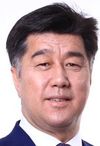- Alikhan Baimenov, Chairman, Steering Committee of the Astana Civil Service Hub, baimenov.alikhan@gmail.com
 Alikhan Baimenov is a distinguished public figure, who has held leading public posts in the Government of the Republic of Kazakhstan, such as the Head of the Executive Office of the President, Head of the Office of the Prime Minister, Chairman of the Agency for Civil Service Affairs, Minister of Labour and Social Protection and as a member of the Parliament of Kazakhstan. Dr. Baimenov has overseen two waves of civil service reform of the Republic of Kazakhstan, as well as the Concept of Social Protection for Kazakhstan’s citizens. He is the author of a series of publications on such issues as social protection, public management and public service, management. Dr. Baimenov is a recipient of a number of national and international awards, including a Special Award of the UN Office of South-South Cooperation for promoting regional and interregional cooperation in the civil service field. He is a member of the National Academy of Natural Sciences of the Republic of Kazakhstan, the Advisory Board for the South-South Network for Public Service Innovation (SSN4PSI), Board of Directors of the Asian Association for Public Administration (AAPA).
Alikhan Baimenov is a distinguished public figure, who has held leading public posts in the Government of the Republic of Kazakhstan, such as the Head of the Executive Office of the President, Head of the Office of the Prime Minister, Chairman of the Agency for Civil Service Affairs, Minister of Labour and Social Protection and as a member of the Parliament of Kazakhstan. Dr. Baimenov has overseen two waves of civil service reform of the Republic of Kazakhstan, as well as the Concept of Social Protection for Kazakhstan’s citizens. He is the author of a series of publications on such issues as social protection, public management and public service, management. Dr. Baimenov is a recipient of a number of national and international awards, including a Special Award of the UN Office of South-South Cooperation for promoting regional and interregional cooperation in the civil service field. He is a member of the National Academy of Natural Sciences of the Republic of Kazakhstan, the Advisory Board for the South-South Network for Public Service Innovation (SSN4PSI), Board of Directors of the Asian Association for Public Administration (AAPA).- Jahi Jahija, State Secretary, The Ministry of Information Society and Administration, Macedonia, Jahi.Jahija@mioa.gov.mk
 Jahi Jahija is a State Secretary in the Ministry of Information Society and Administration since 2011. He has worked in the Agency for Administration since 2000 as a Public Relations Advisor and State Advisor for coordination and selection of civil servants. He is coordinator of many institutions that are in charge to implement the Strategy for Public administration reform (2018-2022). Also, he is coordinating the cooperation with SIGMA, OSCE and other organizations that are involved and they are offering support in the field of administration. He is a member of Governing Board o of Regional School of Public Administration (2011), Chairman of the Board of Directors of ReSPA (2014), a member of the Advisory Board of the Astana Civil Service Hub.
Jahi Jahija is a State Secretary in the Ministry of Information Society and Administration since 2011. He has worked in the Agency for Administration since 2000 as a Public Relations Advisor and State Advisor for coordination and selection of civil servants. He is coordinator of many institutions that are in charge to implement the Strategy for Public administration reform (2018-2022). Also, he is coordinating the cooperation with SIGMA, OSCE and other organizations that are involved and they are offering support in the field of administration. He is a member of Governing Board o of Regional School of Public Administration (2011), Chairman of the Board of Directors of ReSPA (2014), a member of the Advisory Board of the Astana Civil Service Hub.- Bahram Khalilov, Deputy Chairperson, The State Examination Center of the Republic of Azerbaijan, b.khalilov@dim.gov.az
 Bahram Khalilov is the Deputy Chairperson of the State Examination Centre of the Republic of Azerbaijan since 2016, when the Civil Service and the State Student Admission Commissions merged. Prior to this appointment, Mr Khalilov was the Chairman of the Civil Service Commission under the President of the Republic of Azerbaijan (2005-2016). He served as a chief consultant on Legislation and Legal Expertise in the Presidential Administration - formerly the Apparatus of the President - between 1996 and 2005. Mr. Khalilov also served as the Head of Department on Law and Defence of the Ganja City Executive (1994-1996) and as a consultant, chief consultant and Head of Law Department in different institutions (1984-1994). He has also been involved as an expert in several international and local projects. Mr. Khalilov is the author of approximately 20 articles. Mr. Khalilov is the member of the Advisory Board of Regional Hub of Civil Service in Astana and the Advisory Board of the Khodja Ahmed Yassawi International Kazakh-Turkish University.
Bahram Khalilov is the Deputy Chairperson of the State Examination Centre of the Republic of Azerbaijan since 2016, when the Civil Service and the State Student Admission Commissions merged. Prior to this appointment, Mr Khalilov was the Chairman of the Civil Service Commission under the President of the Republic of Azerbaijan (2005-2016). He served as a chief consultant on Legislation and Legal Expertise in the Presidential Administration - formerly the Apparatus of the President - between 1996 and 2005. Mr. Khalilov also served as the Head of Department on Law and Defence of the Ganja City Executive (1994-1996) and as a consultant, chief consultant and Head of Law Department in different institutions (1984-1994). He has also been involved as an expert in several international and local projects. Mr. Khalilov is the author of approximately 20 articles. Mr. Khalilov is the member of the Advisory Board of Regional Hub of Civil Service in Astana and the Advisory Board of the Khodja Ahmed Yassawi International Kazakh-Turkish University.The Astana Civil Service Hub (ACSH), a joint initiative of the Government of Kazakhstan and UNDP, was established in March 2013 by 25 countries and 5 international organizations to serve as a multilateral platform for the continuous exchange of experience and knowledge in the field of public service development. Currently ACSH is comprising 40 participating countries and more than 35 partner organizations.
The ACSH’s mission is to assist in promoting public service effectiveness by supporting the efforts of governments of countries of the region and beyond in building institutional and human capacity. This mission is implemented based on three main pillars:
• Partnerships and networking;
• Capacity building and peer-to-peer learning;
• Research and knowledge management.
Objective
The establishment of public service in the CIS and Caucasus countries is closely connected with the transformation of the role of the state after independence in 1991. Even though the common purpose of reforms for all countries was to build an effective public service, in fact, each country has followed its own unique path in the design and implementation the public service reform agendas. This is precisely why countries, despite the relatively similar starting positions, have achieved the different type of results.
Now is the time to assess the progress made, to draw lessons learnt, and to identify actual problems. Moreover, many methodological aspects of the reforms of the public service of post-socialist countries are insufficiently researched, and it is needed systematically and continuously generate the knowledge.
The main objective of the panel session is to discuss the lessons learned, best practices, as well as to provide participants to share the experience and find the ways to tackle common issues.
Potential Participants
The core participants of the panel are practitioners and academics of government agencies, schools, and research units, and other institutions from Armenia, Azerbaijan, Belarus, Estonia, Georgia, Kazakhstan, Kyrgyzstan, Lithuania, Moldova, Tajikistan, Ukraine, Uzbekistan, as well as Balkan countries.
Expected Outcomes
As a result of the panel session, participants will:
- enhance the processing of lessons learned and how effectively promote civil service reform;
- increase awareness of the most updated, advanced innovations and trends in the field of public service;
- highlight innovative solutions, which have been effectively implemented and how these trends have been spread among the partners;
- develop further ways of cooperation and partnership.


